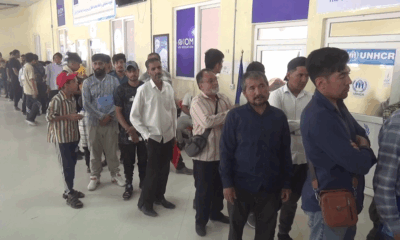Latest News
Bayat Foundation distributes aid to hundreds of flood-affected families in Logar

Bayat Foundation has distributed food aid to hundreds of families affected by recent floods in Khushi district of Logar province.
The aid packages include aid wheat flour, cooking oil and rice.
“Bayat Foundation continues to deliver humanitarian assistance and to serve the Afghan people. It has delivered aid to victims of recent floods and earthquakes in different parts of the country,” said Haji Mohammad Ismail Shah Samand, deputy of Bayat Foundation.
“Fortunately, today also we are distributing food aid to victims of floods in Khushi district of Logar province, including wheat flour, cooking oil and rice,” he added.
Families also thanked Bayat Foundation over the assistance, and called on other aid organizations to follow suit.
“We are very thankful for their assistance to floods victims in Khushi district,” said Abdullah Jan, a local resident.
“A special thanks to Bayat Foundation for their assistance to Khushi residents,” said Noorullah, a local resident.
“We are very thankful to them for assisting us,” said Bibi Gul, a resident of Khushi district.
Officials of Bayat Foundation said that as winter season approaches, they are seeking to increase the level of their assistance to needy families in different provinces of the country.
Latest News
Aid agencies sound alarm as Afghan returnee numbers from Iran spike

More than 800,000 Afghans have returned from Iran through the Islam Qala border crossing in western Afghanistan since January 2025, with over 137,000 arriving in June alone, according to the International Federation of Red Cross and Red Crescent Societies (IFRC).
The massive influx is placing mounting pressure on an already fragile humanitarian landscape.
Many of the returnees arrive in dire condition—exhausted, dehydrated, and lacking basic necessities. At Islam Qala, temperatures frequently soar beyond 40°C, and families often arrive with little more than the clothes on their backs.
Children show visible signs of malnutrition, and mothers express deep anxiety about what lies ahead.
“This issue hasn’t received the attention it deserves,” said Alexander Matheou, IFRC Regional Director for Asia Pacific, during a recent visit to the border. “These individuals are not just statistics—they are families returning to a country that is already burdened by conflict, economic collapse, and natural disasters. They deserve dignity and immediate support.”
The returning population includes many who have lived in Iran—or Pakistan—for years, in some cases decades.
Their decision to leave is driven by worsening economic conditions, tightening legal restrictions on migrants, and increased regional instability.
Since late 2023, over 1 million Afghans have also returned from Pakistan, intensifying the strain on local communities and public services across Afghanistan.
The Afghan Red Crescent Society (ARCS), supported by the IFRC, is spearheading emergency response operations at the Islam Qala crossing.
Volunteers are distributing food and clean water, offering medical services, and operating mobile clinics treating around 500 patients daily—many of whom are pregnant women, children, and the elderly.
Despite these efforts, medical supplies are rapidly dwindling.
“Many mothers we talk to are incredibly fatigued, with their primary focus on the well-being of their children,” said one ARCS nurse. “They’ve endured long journeys under extreme heat, and they’re stepping into uncertainty.”
Once registered, families are transported to Herat City, but challenges continue. Many younger returnees are unfamiliar with life in Afghanistan, while their families struggle to secure housing, income, and access to schools.
Women and girls, in particular, face heightened vulnerabilities in a context where access to education and healthcare remains severely limited.
In June 2025 alone, Afghan Red Crescent volunteers distributed thousands of hot meals daily and provided emergency shelter materials. Still, needs continue to outpace available resources.
“Afghanistan is already under considerable strain,” Matheou stressed. “With the numbers of returning individuals increasing daily—and even more expected soon—this is a crucial time for the global community to act.”
The IFRC is urgently appealing for increased funding and international solidarity to address the escalating crisis. Without expanded support from donors, governments, and humanitarian agencies, the prospects for returning families remain bleak.
“The Afghan Red Crescent Society and its partners are doing everything within their power,” said Matheou. “But the needs are immense. This is not just a border issue—it’s a humanitarian emergency that demands a global response.”
Latest News
USAID cuts may cause over 14 million additional deaths by 2030, study says
The study estimated that over the past two decades, USAID-funded programs have prevented more than 91 million deaths globally, including 30 million deaths among children.

Deep funding cuts to the U.S. Agency for International Development and its potential dismantling could result in more than 14 million additional deaths by 2030, according to research published in The Lancet medical journal on Monday.
US President Donald Trump’s administration, since taking office in January, has made funding cuts to USAID and its aid programs worldwide in what the U.S. government says is part of its broader plan to remove wasteful spending.
Human rights experts and advocates have warned against the cuts. USAID funding has had a crucial role in improving global health, primarily directed toward low and middle-income countries, particularly African nations, according to the study.
The study estimated that over the past two decades, USAID-funded programs have prevented more than 91 million deaths globally, including 30 million deaths among children.
Projections suggest that ongoing deep funding cuts – combined with the potential dismantling of the agency – could result in more than 14 million additional deaths by 2030, including 4.5 million deaths among children younger than 5 years, the study in The Lancet said.
Washington is the world’s largest humanitarian aid donor, amounting to at least 38% of all contributions recorded by the United Nations. It disbursed $61 billion in foreign assistance last year, just over half of it via USAID, according to government data, opens new tab.
“Our estimates show that, unless the abrupt funding cuts announced and implemented in the first half of 2025 are reversed, a staggering number of avoidable deaths could occur by 2030,” the study said.
U.S. Secretary of State Marco Rubio said in March the Trump administration canceled over 80% of all programs at USAID following a six-week review.
The remaining approximately 1,000 programs, he said, would now be administered “more effectively” under the U.S. State Department and in consultation with Congress, Reuters reported.
Latest News
Senior Afghan delegation, led by deputy PM Baradar, in Azerbaijan for ECO Summit
During the two-day summit, scheduled for July 3–4 in Baku, Baradar is expected to deliver a keynote address at the ECO’s general session.

A high-level delegation from the Islamic Emirate of Afghanistan (IEA), led by Deputy Prime Minister for Economic Affairs Mullah Abdul Ghani Baradar, departed Monday morning to participate in the 17th Summit of the Economic Cooperation Organization (ECO) at the invitation of the government of Azerbaijan.
During the two-day summit, scheduled for July 3–4 in Baku, Baradar is expected to deliver a keynote address at the ECO’s general session, alongside other heads of state and senior officials from member countries.
In addition to his participation in the summit’s official proceedings, Baradar will also hold bilateral meetings with Azerbaijani government officials to discuss strengthening cooperation between the two nations across various sectors, including trade, transit, and regional connectivity.
The 17th ECO Summit aims to enhance regional economic integration and collaboration among member states in areas such as infrastructure development, energy, transportation, and investment.
-

 Latest News5 days ago
Latest News5 days agoBayat Power showcases clean energy achievements and vision at Kabul’s Green Growth Forum
-

 Latest News4 days ago
Latest News4 days agoUN urges immediate international aid for returning Afghan refugees
-

 Latest News4 days ago
Latest News4 days agoPrivate sector and UN officials emphasize boosting renewable energy investment in Afghanistan
-

 Sport4 days ago
Sport4 days agoAFPL: Perozi Panjshir, Noorzad FC claim wins in 37th and 38th matches
-

 Regional4 days ago
Regional4 days agoUS talks to Pakistan about promoting ‘durable peace between Israel and Iran’
-

 Latest News3 days ago
Latest News3 days agoFlash floods devastate farmlands and homes across several Afghan provinces
-

 Science & Technology4 days ago
Science & Technology4 days agoInternational Space Station welcomes first astronauts from India, Poland and Hungary
-

 World4 days ago
World4 days agoNo known intelligence that Iran moved uranium: US defense chief
























